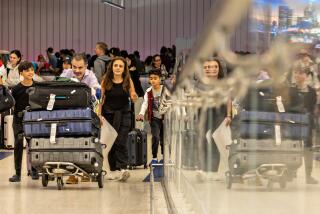Airport Screening Still Found Leaky
- Share via
WASHINGTON — Airport security screeners miss many mock bombs and weapons in undercover tests, despite billions of dollars spent by the government to deploy a force of trained federal employees, investigators told Congress on Thursday.
The comments came during a hearing to evaluate an experiment with private screeners at five airports. Private and government screeners “performed about the same ... equally poorly,” said Homeland Security Inspector General Clark Kent Ervin.
His findings were seconded by the General Accounting Office, the investigative agency of Congress.
That prompted a key lawmaker to demand an emergency meeting with Homeland Security Secretary Tom Ridge.
“We have a system that isn’t working,” said Rep. John Mica (R-Fla.), chairman of the House Transportation and Infrastructure subcommittee on aviation. He said the panel would do “whatever it takes” to remedy shortcomings at the Transportation Security Administration.
David M. Stone, the TSA’s acting administrator, defended his agency, saying security had improved sharply since the Sept 11 terrorist attacks. Stone is the former federal security director for Los Angeles International Airport.
“There is no comparison between what we had at LAX, for example, and what we have today,” Stone said.
The pass/fail rates of airport screeners in undercover tests are classified. While guns are usually easy to spot on an X-ray monitor, bomb components can be hard to detect; and some security experts say that even the best screeners can miss 20% of well-concealed “threat objects.” Screeners are one part, albeit a highly visible one, of a security system that also includes government watch lists and computerized profiling of passengers.
Witnesses at the hearing said the TSA’s centralized bureaucracy had hampered hiring, causing shortages of screeners at several airports. The experiment with private screeners also ran into problems as a result of micromanagement by the TSA, they said.
“TSA’s level of involvement generally eliminated any role the contractors may have played in improving the program,” Ervin said. He said he could draw no firm conclusions about whether private security was better than government security.
TSA’s Stone said private security was 70% effective.
San Francisco International and four other airports -- in Kansas City, Mo.; Jackson, Wyo.; Rochester, N.Y.; and Tupelo, Miss. -- are participating in the experiment.
In November, other airports will be able to apply to the TSA for approval to hire their own security forces, instead of using federal screeners.
Some airport directors testifying Thursday complained of TSA’s one-size-fits-all policies. But it is unclear how many airports will want to hire their own screeners. Questions of liability and funding remain unresolved.
LAX will keep federal protection and has no plans to privatize, spokesman Paul Haney said. “Shortly after Sept. 11, the city of Los Angeles and the mayor were among the first to call for federalization of security,” he said.
Federal security in airports is supported by 59% of Americans, according to a Zogby poll commissioned by a government employee union and released Thursday.
More to Read
Sign up for Essential California
The most important California stories and recommendations in your inbox every morning.
You may occasionally receive promotional content from the Los Angeles Times.













